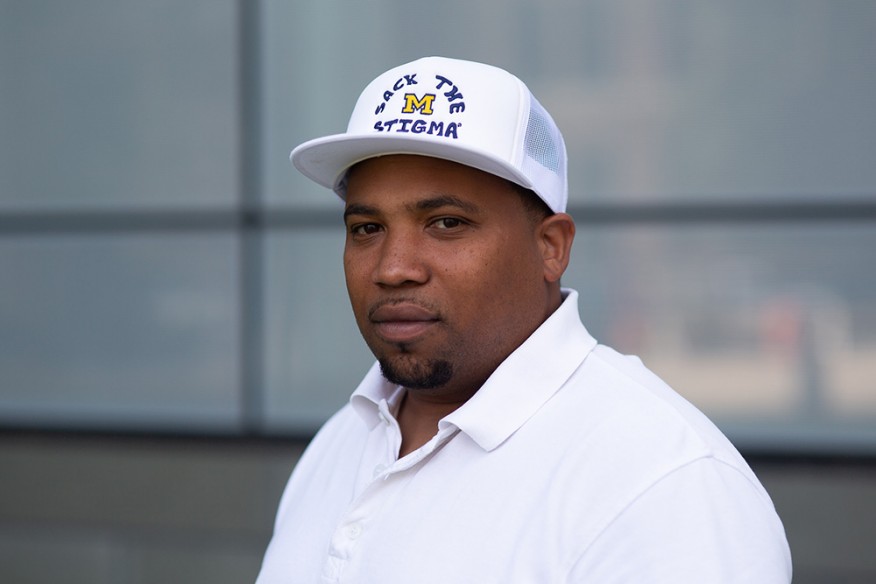-
Pathway:Community Change
What makes you a nontraditional MSW student?
Nicholas Buckingham: I am a product of the school-to-prison pipeline. I caught my first case in 11th grade and dropped out. At 22, I was incarcerated for seven years for armed robbery. It was then I decided to further my education.
I was interested in psychology. I have a little brother with autism, and I really wanted to understand, not only how his brain worked, but humans overall. Also, I questioned a lot of what I came across in prison and was curious about what made people behave in certain ways.
Was it your plan to work and study when you got out?
NB: Not just study, but be successful. My first job was at Family Dollar. They said they were felony friendly. Then they had a meeting of regional managers and discussed me. They let me go due to the discretion of my crime. I started selling weed. One day, my parole officer made an unannounced visit to my house and found some.
I had a conversation with the judge about why people get out of prison and end up right back there. For the first time, I heard how the law lacked resources for people re-entering the community. The judge dropped the charges, but I had violated parole, so they sent me back for 45 days. I talked to others that violated their parole, and they shared their struggles trying to make ends meet. I knew then that I wanted to make changes in the community.
The second time I walked out of prison I walked into my first college classroom at Oakland Community College. My professor was a Black woman. I told her I wanted to study psychology. She said I would never be licensed in the state of Michigan, because of my record.
She said, "You seem like the type that would jump in a hole with someone, although neither one of you might get out. That is what we call social workers, jumping into a hole with people, helping, guiding and setting goals with them. Sometimes not having the structure to make it out, but just having that human connection." I signed up for social work. I earned my undergrad at Oakland University.
Why did you choose U-M for your MSW?
NB: I had this passion since I was a kid for the Wolverines. I loved the football team. As a kid in Detroit, I was excited to go to Ann Arbor and see the campus.
I talked to Yusef Bunchy Shakur. He was an MSW student who was also formerly incarcerated, and I knew other formerly incarcerated folks that went here. They talked about their experiences and the necessities that they brought to this space. I decided to apply. I got a personal email, "Yo, you're coming here." I'm like, "Whoa!" I was just super excited to be a Wolverine.
Do you feel you have found acceptance at the School of Social Work?
NB: I have been accepted, and it is not performative. I'm open about my past. For the last 10 years, I’ve been out there talking about incarceration, the school-to-prison pipeline, poverty, violence and all that. I'm meeting students here that are in tune with social justice and understand the wrongs in the legal system. I have been able to be my authentic self.
Now, the campus can be intimidating. Black folks hear stories of racism at U-M. When the warm weather started, I got out and tried to get over that fear that I was the Black guy that people could read had been to prison. They couldn't.
What is your top concern today, in 2022, as a social worker?
NB: Urban community gun violence. In my community, it’s 24/7. I work in Detroit and live in Inkster. You can't go a day without somebody being shot. How can we as a community curb gun violence without increasing the incarceration of Black and brown people?
There is talk of police and social workers collaborating.
NB: I don't agree with social workers embedded with police. I hate to see people criminalized due to their mental health, and having social workers partnered with police will only increase the number of people incarcerated with mental illnesses. Instead, law enforcement should have mandatory courses in social work and learn about human behavior and social justice.
What about the idea of defunding the police?
NB: The idea is not to abolish the police, but reduce their budgets. The funds for military-grade weapons could go to violence intervention, school boards and re-entry or diversion programs. I'm advocating to change the paradigm.
What kind of work do you see yourself doing when you graduate?
NB: In 2018 I co-founded an organization called Michigan Liberation. We do leadership development with formerly incarcerated folks and develop campaigns to dismantle the criminal legal system. I'm on an education sabbatical, but I plan to go back as an executive director or campaign director.
Social work to me is not just about the degree or the career. It's a healing modality for me to understand my toxicity, my trauma, the baggage I carry, and how it has impacted my community and my family and how I can right my wrongs.
